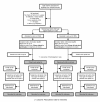A randomised controlled trial to compare opt-in and opt-out parental consent for childhood vaccine safety surveillance using data linkage: study protocol
- PMID: 21199584
- PMCID: PMC3022742
- DOI: 10.1186/1745-6215-12-1
A randomised controlled trial to compare opt-in and opt-out parental consent for childhood vaccine safety surveillance using data linkage: study protocol
Abstract
Background: The Vaccine Assessment using Linked Data (VALiD) trial compared opt-in and opt-out parental consent for a population-based childhood vaccine safety surveillance program using data linkage. A subsequent telephone interview of all households enrolled in the trial elicited parental intent regarding the return or non-return of reply forms for opt-in and opt-out consent. This paper describes the rationale for the trial and provides an overview of the design and methods.
Methods/design: Single-centre, single-blind, randomised controlled trial (RCT) stratified by firstborn status. Mothers who gave birth at one tertiary South Australian hospital were randomised at six weeks post-partum to receive an opt-in or opt-out reply form, along with information explaining data linkage. The primary outcome at 10 weeks post-partum was parental participation in each arm, as indicated by the respective return or non-return of a reply form (or via telephone or email response). A subsequent telephone interview at 10 weeks post-partum elicited parental intent regarding the return or non-return of the reply form, and attitudes and knowledge about data linkage, vaccine safety, consent preferences and vaccination practices. Enrolment began in July 2009 and 1,129 households were recruited in a three-month period. Analysis has not yet been undertaken. The participation rate and selection bias for each method of consent will be compared when the data are analysed.
Discussion: The VALiD RCT represents the first trial of opt-in versus opt-out consent for a data linkage study that assesses consent preferences and intent compared with actual opting in or opting out behaviour, and socioeconomic factors. The limitations to generalisability are discussed.
Trial registration: Australian New Zealand Clinical Trials Registry ACTRN12610000332022.
Figures
References
-
- Commonwealth of Australia. National Statement on Ethical Conduct in Human Research. Canberra: Commonwealth of Australia; 2007. http://www.nhmrc.gov.au/publications/synopses/e72syn.htm
-
- Williams B, Irvine L, McGinnis AR, McMurdo ME, Crombie IK. When "no" might not quite mean "no"; the importance of informed and meaningful non-consent: results from a survey of individuals refusing participation in a health-related research project. BMC Health Serv Res. 2007;7:59. doi: 10.1186/1472-6963-7-59. - DOI - PMC - PubMed
-
- Sommerville A. Commentary: What's wrong with opting out? BMJ. 2001;322:1220–1221.
-
- National Health and Medical Research Council. The Impact of Privacy Legislation on NHMRC Stakeholders - Comparative Stakeholder Analysis. Canberra: NHMRC; 2004. http://www.nhmrc.gov.au/about/privacy_regulation.htm
Publication types
MeSH terms
Substances
LinkOut - more resources
Full Text Sources
Other Literature Sources
Medical


